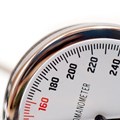Alot of work is being done to highlight the negative effects of raised blood pressure on overall health and to specifically call attention to the relationship between excessive salt intake and hypertension.
To this end, the Heart and Stroke Foundation South Africa (HSFSA), the National Department of Health (NDOH), World Action on Salt, Sugar and Health, Unilever and other important local and international partners have come together to celebrate World Hypertension Day (WHypD) tomorrow (17 May) in alignment with Salt Awareness Week from 15 - 21 May.
World Hypertension Day is a World Hypertension League initiative. The primary aim of this world health event is to increase the awareness of the dangers of high blood pressure or hypertension in populations around the world with the theme “Measure your blood pressure accurately, control it, live longer".
There is a focus on combating low awareness rates worldwide, especially in low to middle income areas, and accurate blood pressure measurement methods. Moreover, there is greater mobilisation globally, to ensure that those individuals who are diagnosed with hypertension and are on medication, are aware that they need to take their medication as prescribed in order to effectively control their condition.
What is hypertension?
Hypertension is defined as the high persistent force of the blood flowing through the blood vessels. Fluctuations in blood pressure are normal which is why it is only diagnosed when it remains high on several occasions or when it is dangerously high on one occasion.
Hypertension is one of the most serious risk factors for death from heart diseases and strokes, and is responsible for about 13% of all deaths globally. In SA, more than one in three adults lives with high blood pressure and it is responsible for one in every two strokes, and two in every five heart attacks.
High blood pressure is known as a 'silent killer' because there are rarely any symptoms or visible signs to warn that blood pressure is high. It is for this reason that more than 50% of people with high blood pressure are unaware of their condition.
The HSFSA and the NDOH urges South Africans to get their blood pressure, cholesterol, blood glucose and weight checked at least once a year or as advised by a practitioner. The foundation, NDOH, Unilever and other partners would also like to empower South Africans through education about what their blood-pressure numbers mean and what steps they can take to control raised bp.
Salt's link to high blood pressure
Most importantly they would like to raise awareness about the relationship between consuming more than 5g of salt per day and high bp as it is well established that a high salt intake is linked to high blood pressure.
World Salt Awareness Week (Saw) is an annual global health campaign driven by the World Action on Salt, Sugar and Health (Wassh). It is aimed at raising awareness about the negative impact of high salt intake on health, particularly raised blood pressure. This year’s world Saw will take place between 15 May and 21 May and calls on communities and industry to “Ditch the salt for the sake of our hearts”.
This year, Saw not only coincides with WHypD but the theme compliments WHypD. Heart attacks and strokes are the greatest cause of death and disability, second to HIV/Aids in South Africa (SA). It has been well established that a high salt intake is linked to high blood pressure, and it is imperative to measure blood pressure accurately in order to control it and live longer.
Wassh acknowledges the strain heart attacks and strokes have on individuals, families and the healthcare system.
Risk factor for heart disease
Pamela Naidoo, chief executive officer of the Heart and Stroke Foundation South Africa (HSFSA) adds: “The HSFSA will continue its efforts to advocate for a healthier environment and create public awareness around hypertension as a major risk factor for heart diseases and strokes."
Sandhya Singh, director in the non-communicable diseases (NCD) cluster at the the NDOH, confirms the department’s commitment towards promoting wellness and preventing the onset of NCDs where applicable. However the department has a responsibility to ensure that persons with hypertension or those at risk, are identified early and linked to care to control their condition and prevent costly medical and other complications.
In adopting an integrated people-centered approach, the department welcomes the opportunity to partner with the HSFSA and other partners to call attention to the relationship between excessive salt intake and hypertension and subsequent cardiovascular and cerebrovascular conditions.
Most cases are entirely preventable, and eating less salt is one of the quickest and most effective ways of improving our health. But in South Africa, up to 60% of the salt we eat is already in the foods we buy, and it’s impossible to take it out once it’s been added in. The HSFSA joins Wassh as we call on food companies to “Ditch the Salt for the sake of our hearts''.
The foundation’s heart mark works with food manufacturers to improve food formulation. The endorsement programme forms part of a health-enabling environment offering you a tool which makes choosing healthier foods easier. It’s a guaranteed way to buy food higher in fibre, lower in saturated fats, lower in sugar and lower in salt.
Sodium the cousin of salt
Sodium and salt are often thought to be the same, but they’re not exactly. Sodium is a mineral that occurs naturally in foods or is added during manufacturing or both. Table salt is about 40% sodium and 60% chloride.
The recommendation is to reduce your salt intake to no more than 5g (1 teaspoon) from all sources, a day. One teaspoon of salt is the equivalent of 2,300 milligrams (mg) sodium. It has been found that in South Africa, 40% of salt is added during cooking or at the table.
South Africa is the first country globally to develop comprehensive, mandatory legislation to reduce sodium levels across a wide range of processed food categories, which involved the co-operation of many food-industry members.
South Africa’s salt-reduction model has inspired the world and to date, more than 90 countries are now implementing salt-reduction policies as per the World Health Organization policy guidelines.
This legislation in SA had a phased approach whereby there was a maximum content target that had to be reached by the end of June 2016, and then a further reduction that had to be reached by the end of June 2019.
Modeling studies have shown that interventions for reducing dietary sodium would result in major health gains and cost savings for the health system. Much still needs to be done should the targeted 30% reduction in salt intake by 2025 be achieved.



































